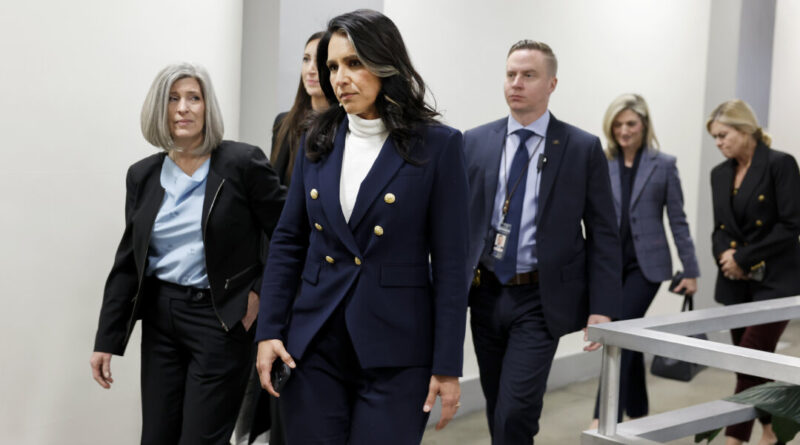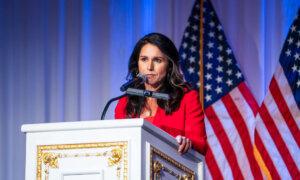Gabbard Visits Capitol Hill Amid Uncertainty Over GOP Senate Support
The former congresswoman has encountered scrutiny regarding a 2017 trip to Syria, during which she met with then-Syrian President Bashar al-Assad.
Tulsi Gabbard is present on Capitol Hill this week in an effort to secure support from the Senate GOP conference for her nomination by President-elect Donald Trump as director of national intelligence, amid uncertain backing.
The experienced former Democratic congresswoman from Hawaii has been questioned by some Senate Republicans concerning her 2017 visit to Syria, where she had a meeting with then-Syrian President Bashar al-Assad. Following Assad’s apparent decline in power after the fall of Damascus, senators’ inquiries about her visit—characterized by Gabbard as a “fact-finding mission”—have increased in intensity.
Sen. James Lankford (R-Okla.), a member of the Senate Intelligence Committee, commented that he had “lots of questions” and indicated that Gabbard would face rigorous questioning during her confirmation hearings.
“We want to understand the purpose and direction of that visit. As a member of Congress, we want to have the opportunity to discuss past comments that she’s made and consider them in full context,” Lankford stated.
In light of these concerns, Gabbard has undertaken multiple visits to the Capitol this week to engage with skeptical senators.
On Dec. 9, she met with Senators Mike Rounds (R-S.D.), Joni Ernst (R-Iowa), and Lankford.
Rounds, who is also a member of the Senate Intelligence Committee, expressed that he was “looking forward to working with her as she progresses through the confirmation process,” calling their meeting “excellent.”
After their discussion, Gabbard addressed inquiries concerning her 2017 trip.
“I fully support and completely agree with the statements made by President Trump in recent days regarding the situation in Syria,” she told reporters.
In a Dec. 7 post on his social media platform Truth Social, Trump stated, “The United States should have nothing to do with” the conflicts in Syria.
“This is not our fight. Let it play out. Do not get involved,” the president-elect emphasized in capital letters.
This stance resonates with the anti-interventionist views that both Trump and Gabbard have long advocated.
Gabbard reiterated that Trump is “fully committed, as he has repeatedly indicated, to ending wars, promoting peace through strength, and prioritizing the national security interests and the safety, security, and freedom of the United States.”
Uncertainties also linger regarding the support for Gabbard from several other senators.
Senators Lisa Murkowski (R-Alaska) and Susan Collins (R-Maine)—who are often thought to be the senators most likely to break from their party on significant issues and nominations—have largely avoided commenting on Trump’s more contentious nominees, including Gabbard.
Similarly, outgoing Senate Republican Leader Mitch McConnell (R-Ky.), who has often diverged from his party on foreign policy as the Republican base has increasingly adopted a non-interventionist stance, has not expressed his position on the nomination.
With McConnell’s imminent departure from leadership and his longstanding disagreements with Trump and Gabbard, his support remains uncertain.
Given the number of undecided votes, Gabbard’s fate hangs in the balance.
Once the new Congress convenes on Jan. 3, 2025, Republicans will hold a relatively large 53-seat majority in the Senate.
This majority permits Republicans to afford up to three defections on any vote, with a tie being broken by incoming Vice President JD Vance.
Many Republicans have vocally supported Gabbard, expressing confidence that she and other nominees facing controversy—including Pete Hegseth’s nomination for the Department of Defense and Robert F. Kennedy’s nomination for the Department of Health and Human Services—will ultimately succeed.
Gabbard is expected to continue her visits to Capitol Hill in the upcoming weeks, alongside Kennedy, Hegseth, and other nominees requiring Senate confirmation.




